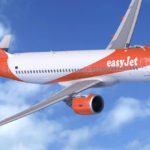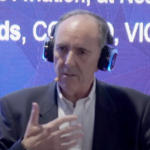Lockheed Martin is pursuing new technologies in space with a “sense of urgency” to address the threats and challenges facing the world in the years ahead.
Speaking at the Farnborough International Airshow, Dan Tenney, vice president of strategy and business development at Lockheed Martin Space, said: “One of the things we’ve seen in space is that we have got to move with a sense of urgency. We think about connecting people worldwide, whether it be the troops in the battlefield or providing early warning to severe weather.
“Lockheed Martin satellites are providing early warning systems for severe weather worldwide. We’re also protecting the most valuable things we can, early warning systems and deterrence from global threats are extremely important to us.
”One of the things we’re working on extremely hard is to build allied nations together. We think that it’s a great thing to have deterrence, it’s the number one thing we can do to deter global threats. When deterrence doesn’t work, we have to engage in defence, but we have strong allied nations that are working together, it is the greatest way we can protect citizens worldwide.”
Collaboration with Northumbria University
Lockheed Martin recently announced a collaboration with Northumbria University that includes a £630,000 investment to support the development of skills, research and technology across the region.
Lockheed Martin is initially set to invest in two strategic projects including finding new ways to transmit power to enable wireless charging of satellites, and for new forms of inter-satellite communications. It will also sponsor two PhDs in solar physics.
Tenney explained: “We’re partnering with Northumbria University in the northeast corridor. It’s extremely important. We’re engaging faculty there and we’re interested in some technologies they have around power beaming as well as laser communication.
“But it is also really important to us because we want to help the United Kingdom build the industrial base as they level up. The interest here in space couldn’t be higher. And one of the things we know we need is more people.”
Subscribe to the FINN weekly newsletter

